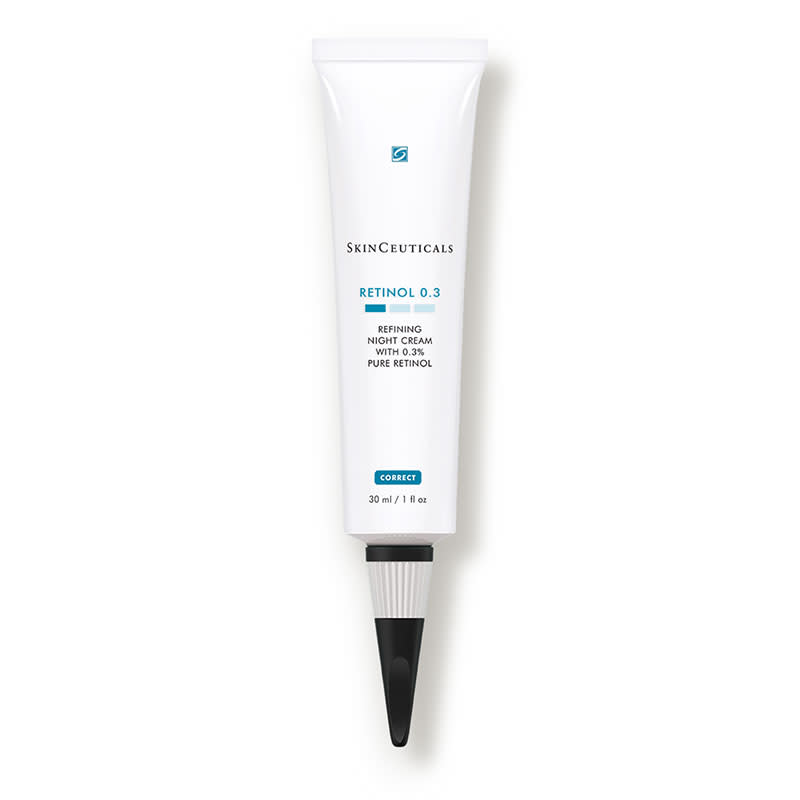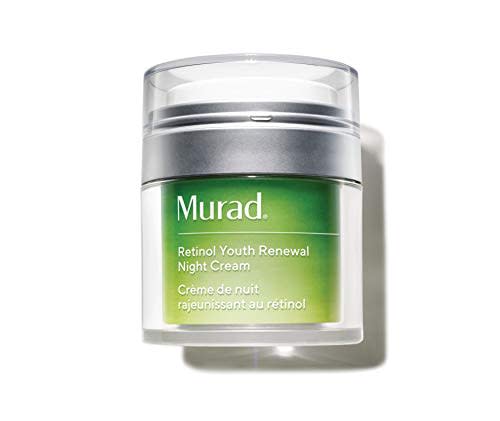I finally tried retinol in my 40s — and I wish I'd done it sooner
Our editors independently selected these items because we think you will enjoy them and might like them at these prices. If you purchase something through our links, we may earn a commission. Pricing and availability are accurate as of publish time. Learn more about Shop TODAY.
As a beauty editor, I can remember the first time I tried a product with retinol. After coming back from a press event where a dermatologist espoused the exfoliating benefits of a new retinol-laced moisturizer, my sensitive-skinned roommate Amy and I jumped in and slathered on the product I had been gifted. We both experienced some burning upon application (“It’s working!” we convinced each other) and then went to sleep, excited to see next-day results.
That morning, I noticed lots of white specks on my cheeks and around my nose when I went to apply my makeup. I assumed it was dead skin shedding, but it was my roommate’s skin reaction — a red, inflamed, and peeling-for-days face — that put an end to my short-lived retinol use.
However, now that I’m over 40 — with skin that doesn’t radiate like it used to — I thought it might be time to revisit retinol. I decided to give a moderately-priced, drugstore retinol from Cerave a try, but not before asking dermatologists for their advice.
Cerave Resurfacing Retinol Serum
Cerave Resurfacing Retinol Serum

Cerave Resurfacing Retinol Serum $16.97 at Amazon
Cerave Resurfacing Retinol Serum $16.97 at Walmart
Cerave Resurfacing Retinol Serum $19.99 at Ulta
What is retinol — and why should you use it?
Retinol is a type of vitamin A that occurs naturally in the skin. When absorbed topically, enzymes in the skin convert retinol to retinoic acid, stimulating the production of healthy new skin cells. The ingredient became popular as an anti-ager when patients using it to treat acne noticed it not only got rid of their blemishes, but also helped diminish wrinkles and reduce pigmentation. It's also known to smooth the skin's texture and provide a brightening glow.
“The use of retinol is core to any anti-aging regime, especially if you’re over 30,” says Dr. Alexis Young, an assistant clinical professor of dermatology at Columbia University Medical Center. “Retinol breaks up the top dead layer of the skin and increases cell turnover, allowing smoother skin to shine through.”
New York-based dermatologist Dr. Joshua Zeichner suggests applying retinol two to three times a week, starting at the lowest concentration and adjusting accordingly.
“The body will develop a tolerance to retinol over one to two months — known as the retinization period — so any irritation experienced at the beginning of therapy should improve over time as your skin adjusts to the product," he told us.
Young agrees that it's best to start with a low percentage of retinol, and then increase based on your skin's sensitivity.
“If your skin tends to be sensitive and dry, then start with a lower strength like 0.3%, increase to 0.5%, and then ultimately 1%, if you can tolerate it, over weeks to months," said Young.
Can’t decide between a cream, serum, gel or lotion-based retinol? Most formulas are equally effective, so it’s just a matter of personal preference.
Does retinol have any side effects?
Given my roommate's skin reaction, I wanted to know more about retinol’s potential side effects, including increased sun sensitivity, a burning sensation upon application, peeling, redness, and dryness.
In the past, dermatologists have instructed patients to apply retinol at night because earlier formulations were sensitive to sunlight. However, modern-day retinol products tend to have gentler formulations.
“The new generation of products release retinol slowly into the skin to minimize irritating effects, giving flexibility of use whenever it fits into your daily routine,” Zeichner said. “Just be sure to apply it after cleansing and before moisturizing, distributing a pea-sized amount on your forehead, nose, cheeks, and chin, before rubbing it in.” He also added that a sunscreen with a minimum SPF of 30 is a must and should be applied on top of the retinol, while makeup can be applied over the SPF.
To further minimize side effects, Young recommends looking for retinol moisturizers that contain strong hydrating ingredients or using a separate moisturizer in addition to your retinol. Unlike prescription products, where the exact concentration of retinol is known, information about the percentage of retinol in over-the-counter products is sometimes nonexistent on the packaging.
“Companies don't want to say their product is biologically changing the skin because then they'd have to be FDA regulated,” said Young. “So you’ll need to look for ingredients like hyaluronic acid and ceramides, which are very effective at adding and sealing moisture into the skin and preventing sensitivity. If a product is too irritating, switch to a different brand or use it more sparingly.”
Dr. Howard Murad, whose eponymous skincare line includes a retinol, argues the percentage of retinol itself isn’t always so telling.
“Oftentimes, it’s about the ingredient pairings which ultimately act as retinol boosters — meaning the percentage isn’t always the best way to gauge efficacy," he told us.
Decades of scientific studies have revealed retinol’s skin benefits, but some wonder whether retinol thins the skin and causes chronic inflammation, leading to premature aging.
“The truth is retinol actually thickens the skin’s top layer, the epidermis, by stimulating collagen and elastin, but it can also thin the stratum corneum, the very top layer of the epidermis, which explains the retinol ‘glow’ that some patients experience,” said Zeichner. “The glow occurs because retinol improves light reflection off the skin’s surface. Thinning of the stratum corneum will not ‘weaken’ the skin, but it can make it more sensitive to sunburn and physical trauma. So you’ll need to be careful when it comes to sun exposure, hair removal, facial scrubs, or anything that exposes the face to trauma or irritants."
If you’re undergoing a chemical peel, facial waxing, or if you’re pregnant, hit pause on your retinol. But you should try to restart usage as soon as possible since tolerance to retinol could be lost, adds Young.
So, how is the Cerave Resurfacing Retinol Serum?
Truthfully, I'm mad at myself for not incorporating retinol earlier. The serum does sting for about 10 seconds upon application, and I did see some white flakes early on, but that’s about it. Better yet, the Cerave Resurfacing Retinol Serum is expert approved.
“I like that it contains niacinamide and licorice root, effective anti-inflammatory agents that help improve the tolerability of a retinol, along with ceramides, which are critical to maintaining the skin barrier and preventing water loss,” Young said. “Plus, it doesn’t feel gritty or pasty like other retinol products and one pump is the perfect dosage for the entire face.”
Adding this anti-aging ingredient to my skincare regime was an easy and inexpensive beauty move. I’m happy to say small areas of pigmentation have diminished and my skin looks fresher than ever. I’ve got a great glow on!
More expert-approved retinol products:
1. Elizabeth Arden Retinol Ceramide Capsules Line Erasing Night Serum
Elizabeth Arden Retinol Ceramide Capsules Line Erasing Night Serum

Elizabeth Arden Retinol Ceramide Capsules Line Erasing Night Serum $48.00 at Amazon
Elizabeth Arden Retinol Ceramide Capsules Line Erasing Night Serum $48.00 at Ulta
Elizabeth Arden Retinol Ceramide Capsules Line Erasing Night Serum $51.00 at Macy's
These small capsules are filled with a lightweight serum containing wrinkle-smoothing retinol and moisture-boosting ceramides.
2. SkinCeuticals Retinol 0.3
SkinCeuticals Retinol 0.3

SkinCeuticals Retinol 0.3 $67.00 at Dermstore
Thanks to its low concentration of encapsulated retinol (0.3%), this skin brightener is ideal for first-time users.
3. La Roche-Posay Retinol B3 Serum
La Roche-Posay Retinol B3 Serum

This gradual-release retinol is combined with moisturizing vitamin B3 and glycerin, which ensures the product is gentle on the skin.
4. Murad Retinol Youth Renewal Night Cream
Murad Retinol Youth Renewal Night Cream

Murad Retinol Youth Renewal Night Cream $82.00 at Amazon
Murad Retinol Youth Renewal Night Cream $82.00 at Sephora
Murad Retinol Youth Renewal Night Cream $82.00 at Ulta
A fast-acting retinoid, time-released retinol, and a retinol booster work synergistically within one formula to deliver results quickly while minimizing irritation.
5. Eve Lom Time Retreat Radiance Essence
Eve Lom Time Retreat Radiance Essence

Eve Lom Time Retreat Radiance Essence $95.00 at Sephora
Eve Lom Time Retreat Radiance Essence $95.00 at Dermstore
This lotion contains a liposome-encapsulated retinol to stimulate collagen production and stave off wrinkles.
For more stories like this, check out:
What is retinol? Here are the benefits, uses and side effects you need to know
11 best drugstore wrinkle creams for 2020, according to skin care experts
This anti-aging serum is my secret weapon to treating pesky pimples
To discover more deals, shopping tips and budget-friendly product recommendations, download the new TODAY app and subscribe to our Stuff We Love newsletter!

